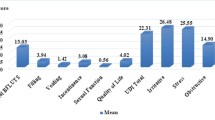Abstract
The available data about the hypothesis that psychological conditions cause urinary incontinence are contradictory. This study was based on a group of patients undergoing urodynamic investigation to define the type of incontinence. Patients were submitted to a battery of psychological tests, including STAXI, CES-D and IBQ (in their Italian version). Patients suffering from urge incontinence showed higher degrees of inner anger and anger trait than those suffering from stress or mixed incontinence. Neither group showed signs of depression. The conviction of illness was greatest in patients suffering from stress or mixed incontinence, whereas irritability and general hypochondria prevailed in patients suffering from urge incontinence. Such patients tend to develop psychosomatic reactions that may contribute to the severity of their symptoms.
Similar content being viewed by others
References
Couillard DR, Webster GD. Detrusor instability.Urol Clin North Am 1995;22:593–612
Freeman RM, Baxby K. Hypnotherapy for incontinence caused by the unstable detrusor.Br Med J 1982;284:1831–1834
Vereecken RL. Psychological and sexual aspects in different types of bladder dysfunction.Psychother Psychosom 1989; 51:128–134
Lagro-Janssen AL, Debruyne FM, Van Weel C. Psychological aspects of female urinary incontinence in general practice.Br J Urol 1992;70:499–502
Stone CB, Judd GE. Psychogenic aspects of urinary incontinence in women.Clin Obstet Gynecol 1978;21:807–815
Macaulay AJ, Stern RS, Holmes DM, Stanton SL. Micturition and the mind: psychological factors in the aetiology and treatment of urinary symptoms in women.Br Med J 1987;294:540–543
Norton KRW, Bhat AV, Stanton SL. Psychiatric aspects of urinary incontinence in women attending an outpatient urodynamic clinic.Br Med J 1990;301:271–272
Walters MD, Taylor S, Schoenfeld LS. Psychosexual study of women with detrusor instability.Obstet Gynecol 1990;75:22–25
Drutz HP, Doody K, Gilbey P. The role of psychological screening tests in the evaluation of women with persistent lower urinary tract problems: a prospective, blinded study.Urogynecol Int 1995;9:21–30
Wyman JF, Harkins SW, Choi SC, Taylor JR, Fantl A. Psychosocial impact of urinary incontinence in women.Obstet Gynecol 1987;70:378–381
Southerst JR. Sexual dysfunction and urinary incontinence.Br J Obstet Gynaecol 1979;86:387–388
Field SM, Hilston P. The prevalence of sexual problems in women attending for urodynamic investigation.Int Urogynecol J 1993;4:212–215
Berglund AL, Eisemann M, Laols O. Personality characteristics of stress incontinent women: a pilot study.J Psychosom Obstet Gynecol 1994;15:165–169
Spielberger CD. STAXI: State Trait Anger Expression Inventory, Italian version. 1992; Firenze Organizzazioni Speciali
Radloff LS. The CES D scale.Appld psychol Meas 1977;1:385
Schwenkmezger P, Hodapp V. A questionnaire for assessing anger and expression of anger.Z Klin Psychol Psycopathol Psycother 1991;39:63–68
Pilowsky I, Spence ND. Patterns of illness behaviour in patients with intractable pain.J Psychosom Res 1975;19:279
Author information
Authors and Affiliations
Additional information
Editorial Comment: Understanding a patient's perception of their incontinence and ability to cope with symptoms is an important aspect of a clinician's ability to educate the patient and treat their incontinence successfully. This is particularly true when using behavioral therapies, where the patient's understanding of the cause of their incontinence and their own volitional control of the lower urinary tract directly affects success. The investigators find that patients with DI experience more internally driven rage, which is poorly expressed, and a higher incidence of irritability and hypochondria than patients with GSI or mixed incontinence. This overall increased inner frustration may stand in the way of learning to deal with and overcome uncontrolled activity. It behooves the clinician to address this frustration in a compassionate and caring yet direct manner to maximize the patient's compliance to therapy, thus improving their chance of regaining bladder control.
Rights and permissions
About this article
Cite this article
Chiara, G., Piccioni, V., Perino, M. et al. Psychological investigation in female patients suffering from urinary incontinence. Int Urogynecol J 9, 73–77 (1998). https://doi.org/10.1007/BF01982211
Issue Date:
DOI: https://doi.org/10.1007/BF01982211




